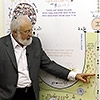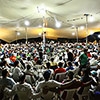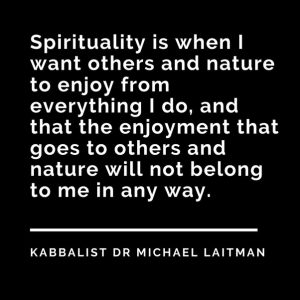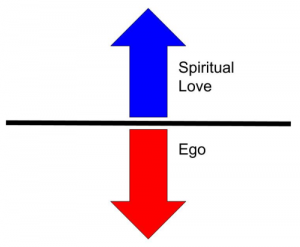 Michael Laitman, On Quora: “How do we improve spiritual health?“
Michael Laitman, On Quora: “How do we improve spiritual health?“
Spiritual health is a state where we positively connect among each other in order to draw closer to spirituality, i.e., to a state where we are united with a common intention to love and care for each other.
It is a state where we establish a connection with the upper force of love, bestowal and connection that fills reality through our common intention to connect as a single soul with such qualities in our connections.
By doing so, we evoke the upper force of love, bestowal and connection, a force that in the wisdom of Kabbalah is called “the reforming light,” into the connection between us, and this force binds us together with a common intention to love, care and bestow to each other.

Several people try to reach a state of spiritual health and well-being on their own, assuming that it is possible to do so. However, it is impossible to attain anything spiritual alone.
In order to attain spiritual health and well-being, we need to feel that we are in the field of the upper force, a force of love, bestowal and connection, and that we depend on this force. If we understand the extent to which we depend on this force in order to hold any sort of connection with spirituality, then we will aim our requests, demands and prayers at this force, similar to how a child holds its parents’ hand, not letting it go. We will then turn to this force in order to make improvements and corrections on ourselves, that whenever we discover anti-spiritual egoistic thoughts and desires in ourselves, i.e., thoughts and desires that prioritize self-benefit over benefiting others and nature, then we will request a change the direction of these thoughts so that they will be loving, giving and positively connecting, similar to the bestowing direction of the upper force.
We thus move toward a state of spiritual health and well-being by learning about spirituality, participating in a environment that supports our spiritual progress, and drawing the influence of spiritual forces (the “reforming light”). Such a process takes place until we discover where we are spiritually unhealthy, i.e., by reaching a state called “recognition of evil” in Kabbalah, where we see how our egoistic nature opposes and resists spirituality. Through such states, we gradually develop a true demand for spiritual health and well-being, a state called “correction” in Kabbalah, i.e., the correction of our ego that brings about division and hatred among people, to its altruistic opposite, which brings about unity and love among us—the qualities of the soul.
This is how we become spiritually healthy. We place ourselves in the place of the upper force of love, bestowal and connection, and become more and more like that force until we completely discover spirituality.
Thus, we should consider how to strengthen human connection and make it more positive, with bonds of love, care and giving. We will then eventually discover the great single soul that we are all parts of, perceiving and sensing how we are all like its cells and organs, mutually complementing one another to sustain the spiritual health of the entire system.
For the time being, we are still far from such a state. We have yet to begin a process of realizing our interdependence and interconnectedness in a positive manner, where we each aim to love, bestow and positively connect above all the egoistic forms of indifference, apathy, division and hatred that surface. We would thus be wise to learn and scrutinize the laws of mutual guarantee and mutual responsibility that bind the spiritual system together, which should lead us to actively seek how we can draw the spiritual forces into our connections and establish a spiritually healthy, peaceful, harmonious and balanced state among us.
Based on a Kabbalah Lesson at the World Kabbalah Convention in New Jersey, on May 12, 2012. Written/edited by students of Kabbalist Dr. Michael Laitman.
Filed under: Q&A, Quora, Spirituality - No Comments →
 Question: Did the process of the breakage of the general system happen gradually or instantly?
Question: Did the process of the breakage of the general system happen gradually or instantly?


 Michael Laitman, On Quora:
Michael Laitman, On Quora:









